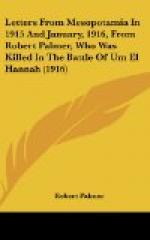Our camp was about five miles from the Turkish position (downstream) but our forward trenches were within about 1,000 yards of it.
On January 20th our guns bombarded the enemy’s trenches at intervals during the day, and on the following morning at 3 a.m. we moved out of camp preparatory to the attack which was to commence about 6.30 a.m.
The —— Brigade was to push the main attack with the —— Brigade (ours) in support of it, whilst a third brigade was to make a holding attack on our right.
The leading brigade entrenched itself during the night within about 500 yards of the position, whilst our Regiment with one Indian Regiment formed the first line of supports. We were in our trenches about 1,000 yards from the enemy’s position, ready to make the attack, by 6 a.m.
For some reason, which I do not know, the attack was delayed, and our guns did not open fire till 7.45 a.m. instead of 6.30 as originally intended.
At 7.55 a.m. after our guns had bombarded the enemy’s trenches for only ten minutes the infantry were ordered to advance to the attack, our support line advancing at the same time.
Our Battalion, which consisted of three Companies (one Coy. being in Kut-el-Amara) advanced in three lines, “B” Coy. forming the first line under Lieut. Needham, “C” Coy. the second line under Capt. Page Roberts, and “D” Coy. the third line under Capt. North with Capt. the Hon. R. Palmer as his 2nd in command. Lt.-Col. Bowker was with the third line.
As soon as we left the trenches we were under a heavy rifle fire, and as we advanced this became more and more intense, with machine gun and shrapnel fire added. The ground was perfectly flat and open with no form of cover to be obtained, and our casualties soon became very heavy. We continued to advance till we got to within about 150 yards of the enemy’s trenches, but by this time our casualties were so heavy that it was impossible to press home the attack without reinforcements, though at the extreme left of our line, our troops actually got into the first line of trenches, but were bombed out of them again by the Turks.
No reinforcements reached us, however, and we afterwards heard that the Regiment which should have come up in support of us was enfiladed from their right and was consequently drawn off in that direction. All we could do now was to hold on where we were, making what cover we could with our entrenching tools, and this we did until darkness came on, when we withdrew.
The weather had been terrible all that day and night, there being heavy rain with a bitterly cold wind coming off the snow hills. The ground became a sea of mud which made it most difficult to remove the wounded, and many of these had to lie out till the armistice was arranged the following day.
* * * * *
FURTHER DESCRIPTIONS OF THE FIGHT AT UM EL HANNA, BY EYE-WITNESSES.




